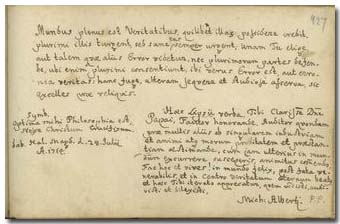
Mundus plenus est veritatibus, quilibet illas possidere credit,
plurimi illis turgent, sed sane eas semper urgent. Unam Tu elige,
aut talem quae aliis Error videtur, nec plurimorum partes defende;
ubi enim plurimi consentiunt, ibi verus Error est, aut erronea
veritas: hanc fuge, alteram sequere et studiose asserva, sic
excelles prae reliquis.
Haec Lipsii verba, Tibi Clariss[im]e D[omin]e Papai, Fautor
honorande, Auditor quondam prae multis aliis ob singularem
industriam et animi atque morum probitatem et praestantiam
aestimande, cum iam ulterius in mundum excurrere susceperis,
animitus commendo. Fac hoc et vives! in mundo felix, post fata
venerabilis et in centro veritatum aeternum beatus et haec Tibi
iterato apprecatur, quem vidisti, audivisti et dilexisti.
Mich[ael] Alberti P. P.
Symb[olum] Optima mihi Philosophia est, Nosse Christum Crucifixum.
*
dab[am] Hal[ae] Magd. d. 28. Julii A. 1714.
|
* The motto can be regarded as a
paraphrase of 1Cor 2:2: “Non enim iudicavi scire me aliquid vos nisi Iesum
Christum et hunc crucifixum” / “For I determined not to know
anything among you, save Jesus Christ, and him crucified.”
|
|
|
|
The world is full of truths; whoever believes to possess them,
usually only flaunt them, while chasing them. Choose one, even if
it seems erroneous to others; and do not choose with the many:
because in what the multitude agree, that is the true error, or
the erroneous truth. Therefore flee this, follow the other, and
keep faithful to it: thus you will excel above others.
These words of Lipsius I recommend to you
from my heart, o illustrious Mr. Pápai, my estimable assistant,
and honorable former student, now as you are going to set out to
the world. Do so and you will live! fortunately in the world, in
honour after your death, and happily in the middle of heavenly
truths. This is wished to you by him whom you have seen, heard and
appreciated,
Michael Alberti, professor of
philosophy
Motto: All my philosophy is the knowledge of
the crucified Christ. *
I wrote in Halle of Magdeburg, on July 28, 1714.
|
p. 427. Halle, July 28, 1714
Alberti, Michael
(1682-1757), German physician,
university professor
Michael Alberti was born on November 13, 1682 in Nürnberg, the son
of the local pastor Paul
Martin Alberti (1640-1705). He studied theology in Nürnberg and
Altdorf, and later in Jena, where he also read medicine. He
disputed in Halle under the chairmanship of Georg Ernst Stahl, and
he graduated in medicine in 1704. He habilited privat-docent in
medicine and philosophy, and in 1710 he became extraordinary
professor. In 1716, as Stahl left the university of Halle, Alberti
became his successor with his recommendation. From 1719 he was
also a professor of physics. He kept his chair on the faculty of
medicine until his death. He was a member of the Scientific
Society of Berlin, and – with the name of
Andronicus – of the Academia Leopoldina. He died on May 17, 1757
in Halle. He was a close friend and the most renowned follower of
Stahl, and an enthusiastic upholder of the animistic theory as
opposed to the mechanistic one. He was characterized by a general
knowledge of medicine, as well as certain aesthetic and
philosophic ideas. He also studied the legal aspects of medicine,
and was one of the initiators of forensic medicine. He wrote a
number of manuals, as well as hundreds of short occasional
publications. Some of his works: Dissertatio medica, de hypochondriaco-hysterico malo.
Praeses Georgius Ernestus Stahl. Halle, 1703. – Disputatio
inauguralis medica de erroribus medicinae practicae. Praeses
Georgius Ernestus Stahl. Halle, 1704. – Introductio in
universam medicinam etc. Halle, 1715-26. 4 tom. – Systema
jurisprudentiae medico-legalis. Leipzig, 1725-47. 6 tom.
– Our Library preserves the
dissertation of Goddofredus Moller defended under his chairmanship
in 1730.
Georg Ernst Stahl wrote in the album of Pápai Páriz
six days before Alberti (p. 179).
•
ADB • Jöcher-Adelung • Meusel • Michaud |

